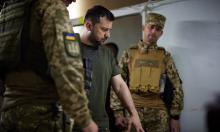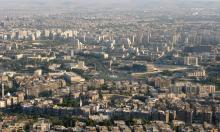Argentine Government looks for a broader center-left alliance
 As president Nestor Kirchner breaks off ties with his mentor and antecessor in office, Eduardo Duhalde, his collaborators moves into approaches with center-left leaders.
As president Nestor Kirchner breaks off ties with his mentor and antecessor in office, Eduardo Duhalde, his collaborators moves into approaches with center-left leaders.
Argentina's economy is recovering well after its largest-ever financial crisis in 2002. This year, the South American country will grow 7.3% and a similar rate is expected for 2004. Step by step, unemployment falls, exportations and salaries grow and social benefits mitigate the effects of almost 20 million living in poverty.
However, despite the significance of the crisis, the main challenge that Argentine President Nestor Kirchner faces now is not economical, but political. Kirchner has been trying to introduce crucial reforms in sensitive areas as the Military, the Police and the connections between crime organizations and the local political powers. But has a constitutive problem: Kirchner belongs to the Peronist Party (the same of Peron and Evita) who rules in 17 of the 24 electoral districts Argentina has. As such, in some cases, Kirchner has to deal with corrupted structures created by his old fellows.
An example of that is the recent sordid dispute between Kirchner and his mentor and antecessor in office, ex President Eduardo Duhalde, sparked by a wave of hijacking with political connotations in Buenos Aires Province. Duhalde's power is based in Buenos Aires Province, which is in turn, country's main district, as concentrates almost half of Argentina's population.
In a recent open letter, Duhalde gave a strong support to Kirchner's administration, but the followers of the former president do not share Duhalde's view. They control almost 70% of Buenos Aires' municipalities and have been accused of having ties with criminal organizations and the corrupted local police force. The Major of one of the most populated areas in the outskirts of Buenos Aires City, Jesus Cariglino, is in jail facing corruption charges. According to some sources this has sparked the rebellion of Buenos Aires' majors against president Kirchner and the Governor of the Province, Felipe Sola.
As long as rebellion grows, Duhalde looses power and doubts in giving full support to Kirchner. Therefore, Kirchner's collaborators study a broader alliance with other center-left political forces that share presidential views. The new coalition -still on papers- has been nicknamed "transverse force", as joins a portion of the centrist Peronist Party, Socialists and independent leaders.
PRAVDA.Ru asked Argentine chief of Cabinet, Alberto Fernandez, what does "transverse force" mean. He answered: "It is a very complex idea. I do not know if all Argentina understands it. As for me, it is the way in which Argentineans look for a number of lost values: Justice, solidarity and social justice". However, observers say there is something unfeasible in this project as joins highly questioned populist local leaders with prominent members of progressive forces.
Another key member of Kirchner's cabinet who is looking for a broader support is the minister of Economy, Roberto Lavagna. Recently, Lavagna told PRAVDA.Ru that his intention was to develop the internal market by "increasing salaries" and unions and workers support his policies. Last week, Lavagna met with economists from the leftist Central of Argentine Workers, or CTA, as listen to their ideas to deepen country's economy. Pro-market thinkers, used to monopolize the dialogue with the authorities have criticized the meeting of the minister with CTA leaders.
It is not clear yet weather a center-left coalition will rule Argentina under Kirchner's power. However, it is clear that the new force will be essential for Kirchner if he loses support from his old peronist fellows.
Hernan Etchaleco
Pravda.ru
Subscribe to Pravda.Ru Telegram channel, Facebook, RSS!




